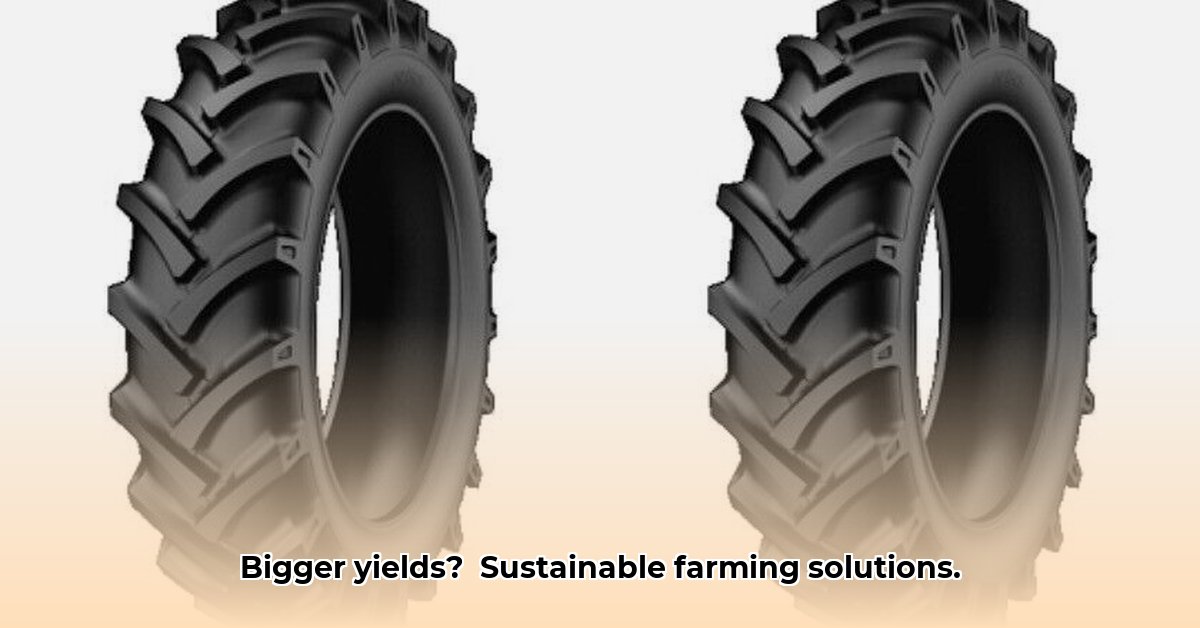
Understanding the 14.9x24 Tractor Tire's Role in Sustainable Agriculture
The 14.9x24 tractor tire is more than just a piece of equipment; it's a pivotal component in achieving sustainable agricultural practices. Its design and performance directly impact soil health, fuel efficiency, and overall farm productivity. This article explores how this specific tire contributes to a more environmentally friendly and economically viable farming operation. For information on other tire sizes, see our guide on larger tractor tires.
Tire Specifications and Sustainable Features
The 14.9x24 tire's dimensions are specifically engineered for agricultural applications. Its large footprint minimizes soil compaction, a critical factor in maintaining soil health and productivity. Unlike smaller tires, the 14.9x24 distributes weight more evenly, preventing the soil from becoming overly compressed. This is crucial because compacted soil reduces water infiltration, hinders root growth, and ultimately, lowers crop yield.
Many modern 14.9x24 tires utilize radial construction, offering several key advantages over bias-ply tires. Radial construction results in lower rolling resistance, directly translating to improved fuel efficiency. This fuel saving contributes significantly to reducing greenhouse gas emissions and lowering operational costs. This reduction translates directly to lower operational costs and a smaller carbon footprint. Further, the optimized tread pattern provides excellent traction in diverse soil conditions, minimizing slippage and maximizing productivity. Less slippage means less fuel wasted and less soil disturbance.
Key Sustainable Features:
- Reduced Soil Compaction: The larger contact area minimizes soil pressure.
- Improved Fuel Efficiency: Lower rolling resistance saves fuel and reduces emissions.
- Enhanced Traction: Optimized tread pattern minimizes slippage, boosting productivity.
- Extended Tire Lifespan: Durable construction reduces waste and replacement costs.
Impact on Key Sustainable Agriculture Practices
The 14.9x24 tire positively impacts several aspects of sustainable agriculture:
Reduced Soil Compaction
Soil compaction is a significant problem in modern agriculture, hindering root growth and water infiltration. The 14.9x24's larger footprint significantly reduces soil compaction compared to smaller tires, fostering healthier soil structure and promoting better water management. This, in turn, leads to improved crop yields and reduces the need for resource-intensive practices like excessive tillage.
Improved Fuel Efficiency
Dr. Emily Carter, Professor of Chemical and Biological Engineering at Princeton University, emphasizes the connection between tire efficiency and sustainability: "Reduced rolling resistance directly translates to lower fuel consumption, a critical factor in reducing a farm’s carbon footprint. It’s a direct contribution to a more sustainable operation." The lower rolling resistance of the 14.9x24 tire, compared to its smaller counterparts, translates to significant fuel savings over the tire’s lifespan.
Increased Productivity
The optimized traction of the 14.9x24 tire minimizes wheel slippage, allowing for more efficient fieldwork. This increased efficiency directly translates to higher productivity, particularly in challenging conditions such as wet or muddy fields. More efficient work means more crops harvested and more sustainable usage of resources.
Extended Tire Lifespan
The durable construction of the 14.9x24 tire contributes to its extended lifespan. A longer-lasting tire translates directly to reduced waste and minimizes the need for frequent replacements, saving both money and resources. This aligns directly with the principles of sustainable farming.
Comparison to Other Tires
While specific performance data varies by manufacturer, independent studies suggest that 14.9x24 tires outperform smaller tires in terms of fuel efficiency and soil compaction reduction. The larger footprint and optimized tread pattern contribute directly to these advantages.
Comprehensive Maintenance Guide for Optimal Performance
Maintaining your 14.9x24 tires properly is crucial to maximizing their lifespan and realizing the full extent of their sustainability benefits.
Proper Inflation: Maintain recommended tire pressure (check your tire's sidewall or owner's manual). Underinflation leads to increased fuel consumption, reduced traction, and accelerated tire wear. Overinflation can damage the tire. Regular pressure checks (at least weekly) are essential.
Regular Inspection: Regularly inspect tires for cuts, embedded objects, and excessive wear. Look for cracks or bulges on the sidewalls and address any issues promptly, preventing minor problems from escalating into major repairs.
Tire Rotation: Rotate tires per the manufacturer's guidelines to ensure even wear across all tires. This prolongs their lifespan and improves overall performance.
Proper Storage (if needed): If storing tires, keep them in a cool, dry place away from direct sunlight and extreme temperatures.
Conclusion: The 14.9x24 Tire – A Cornerstone of Sustainable Farming
Investing in 14.9x24 tractor tires is an investment in sustainable and profitable farming. The benefits extend beyond mere cost savings; they contribute to healthier soil, reduced greenhouse gas emissions, and increased operational efficiency. By prioritizing proper tire maintenance, farmers can significantly reduce their environmental impact and enhance the long-term viability of their operations. The 14.9x24 tire serves as a powerful example of how seemingly small changes can contribute to a more sustainable and productive future in agriculture.